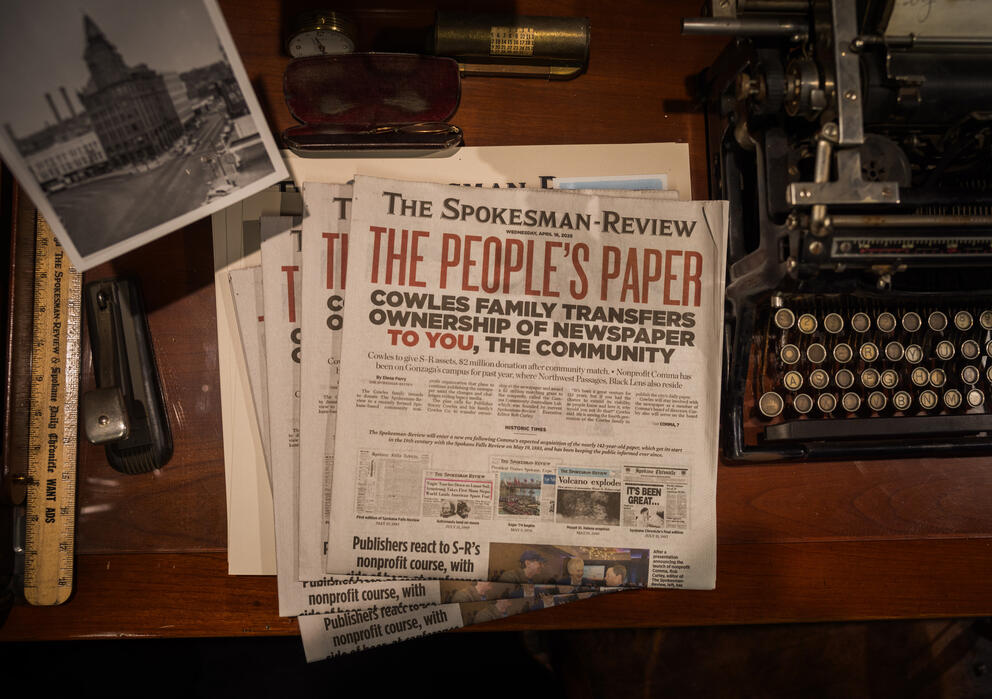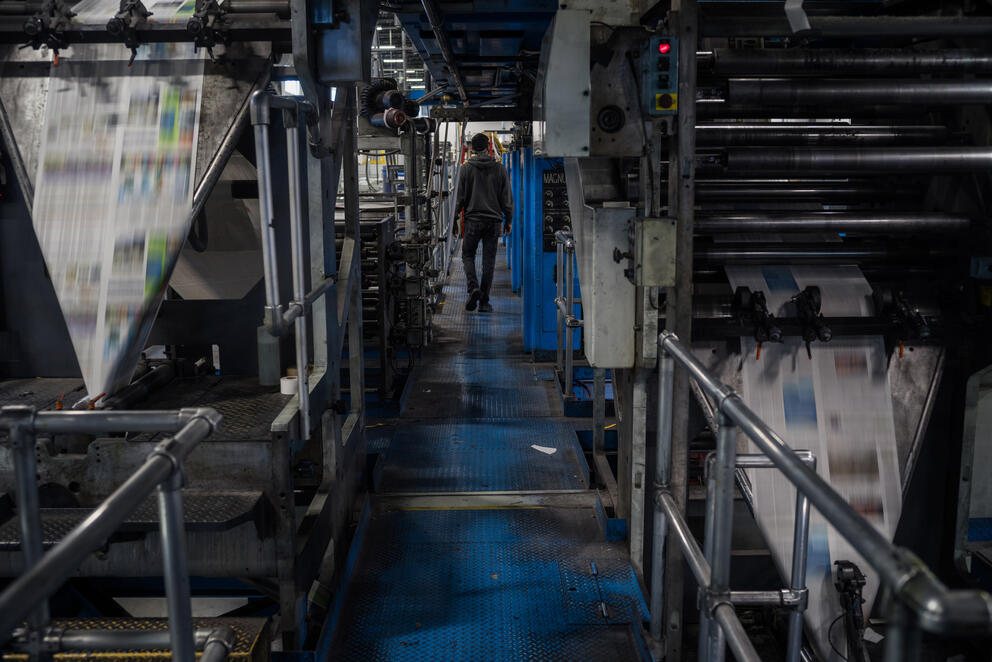Cowles and his family have owned the paper for more than a century and didn’t want it to go the way of so many others: to a hedge fund or corporate entity more invested in the organization’s assets than its journalism.
Instead, earlier this month, the family took different path: They would donate The Spokesman-Review to a new nonprofit in Spokane, along with $2 million to transition the paper into a subscription-driven publication rather than one dependent on advertising, as it had been for decades.
“The Cowles family chose what in my mind is community service rather than profit maximation,” said Benjamin Shors, chair of the Department of Journalism and Media Production at the Edward R. Murrow College of Communication at Washington State University. “It would have been snapped up in a heartbeat by a chain or hedge fund. That would have been problematic for local news in Eastern Washington.”
For Cowles, it was the only way forward. “The feeling is the brand is way more important,” he said. “Having a community entity as new stewards makes a ton of sense. This isn’t a business that anyone will get rich on anymore.”
For years, newspapers have grappled with the loss of advertising and consequent cuts, job losses and overall deterioration of the local reporting most critical to a functioning democracy.
Many news publications have responded by transitioning to a nonprofit model. Publications like The Philadelphia Inquirer and The Salt Lake Tribune, once owned by huge corporate newspaper chains, have put their stakes in nonprofit ownership in recent years.
“We’re fast approaching a situation where the community infrastructure around information is very damaged,” Shors said. “We need to repair and strengthen local news as a critical public policy and philanthropic goal. I think this is a good first step in Spokane — to really rally the community around the principle that local news matters to communities, not just to journalists.”
With the Cowles family donating $2 million along with the newspaper on the condition that the amount be matched by community donations, The Spokesman-Review will be equipped to weather the transition in the short term and then move toward sustainable operations, Cowles said.
The family will own the paper until the transition is complete, which could be as early as October, said Rob Curley, The Spokesman-Review's executive editor since 2016. The transition includes setting up the systems needed to run a digital news operation.
“It’s really about the logistics of how you take a legacy company that’s over a century old and have it behave more like a startup,” he said.
Thanks to a loyal readership among older adults, Spokesman-Review’s print circulation revenue remains in the eight figures, he said. Now the paper needs to sustain and grow readership, especially among younger Washingtonians who don’t currently read newspapers.
A philanthropic model might help reach them. The paper could offer complimentary subscriptions to businesses who make substantial donations, said Curley.
According to data from the Bridgespan Group, increased readership for the Spokane paper in recent years has boosted community and civic engagement more broadly, increasing voter turnout and the number of people running for office.
“You can literally show this helps democracy,” Curley said.
Editor Rob Curley (center, in white) takes a selfie with a group from Leadership Spokane during a tour of the rooftop of The Chronicle building in downtown Spokane. The building’s gargoyles have become an iconic symbol of Spokane news. The Chronicle, a former competitor of the Spokesman-Review, went out of business in 1992, and the building has been converted to apartments during the past decade. (Rajah Bose for Cascade PBS)
Looking at other models
About a year ago, Cowles reached out to The Lenfest Institute, the nonprofit organization that took over The Philadelphia Inquirer. The organization is named after H.F. “Gerry” Lenfest, an entrepreneur who built his fortune on a cable television business. He would later fund cultural and community institutions, including the Philadelphia Art Museum, the Curtis Institute of Music and Temple University.
In 2014, Lenfest was part of the group that purchased The Philadelphia Inquirer. Lenfest would later buy out other shareholders, taking full control of the outlet. He founded The Lenfest Institute in 2016. The organization is a non-controlling owner of the Inquirer, meaning it provides funding but has no control over day-to-day operations.
Part of The Lenfest Institute’s work, much of it pro bono, includes helping publications like The Spokesman-Review explore making the switch to nonprofit status.
“I think what they’ve done is extraordinarily laudable and positive for their community,” said Jim Friedlich, executive director and CEO of The Lenfest Institute, of the Cowles family’s decision to transition The Spokesman-Review to a nonprofit model. "They essentially chose the future of their family’s newspaper and its contributions to the community over a near-term value [from] a transaction to a financial buyer.”
The nonprofit approach doesn’t necessarily mean forgoing profits entirely, Friedlich said. The Seattle Times remains a family-controlled for-profit newspaper, he noted. But it also funds reporter positions and specific coverage through funds from the Seattle Foundation.
The main advantage of a nonprofit model is that it allows a news organization to break even instead of having to provide a return to investors, he said. Some residents may be more generous with donations to a nonprofit.
The Spokesman-Review's past efforts to generate community support include the Northwest Passages Book Club, a series of events featuring high-profile authors. While the events were free, attendees were given the opportunity to donate.
The newspaper said Northwest Passages generated more than $1 million in donations, which has helped sustain newsroom operations, Curley said.
Curley also founded Comma Community Journalism Lab, a nonprofit organization that is developing a model for funding community-backed independent journalism that could be replicated in other communities and cities.
The Spokesman-Review would be under that nonprofit.
Last year, The Black Lens, a newspaper aimed at Spokane’s Black community, relaunched after a nearly two-year hiatus under a partnership with Comma and The Spokesman-Review, which helps distribute the monthly paper.
Comma’s long-term goal is to house numerous newsrooms that can produce journalism for a variety of rural communities and communities of color, with staff providing content across different publications.
News publications like The Black Lens and The Spokesman-Review would remain the public face of the organization, Curley said.
A tax status, not a business model
The changes at The Spokesman-Review have generated buzz in Spokane and across the journalism industry nationwide, as well as numerous reader questions. (Curley fielded some in a recent question-and-answer piece.)
A major question is whether The Spokesman-Review can remain financially sustainable over the long term.
“A change from profit to nonprofit is a change in tax status, it’s not a change in business model. It’s easy to confuse the two,” said Friedlich. “[Nonprofit status] needs to be accompanied by a tangible plan.”
Recently, nonprofit news organization Houston Landing announced it would shut down after launching a little over two years ago. While the publication had a $20 million seed investment, the publication struggled to secure long-term revenue sources.
Shors, the WSU journalism department chair, said Spokane’s success lies in community support. “The community is going to have to step up and say, ‘We’re going to subscribe, we’re going to donate, we’re going to support this endeavor because we believe nonprofit local news has a place in our community,'” he said.
In the question-and-answer piece, Curley stressed the importance of maintaining multiple revenue streams for the paper, including advertising and subscriptions, calling it a “hybrid model.”
In an interview, he said the new approach could help the newsroom grow. “The journalism is not going to change; there’s going to be more of it,” he said.
A pressman walks past the newspaper press as it runs a section of the Spokesman-Review's Sunday paper at Northwest Offset Printing last Friday. The printing of the paper was transferred to Northwest Offset Printing in Spokane Valley in 2020 after 125 years of printing in downtown Spokane. (Rajah Bose for Cascade PBS)







